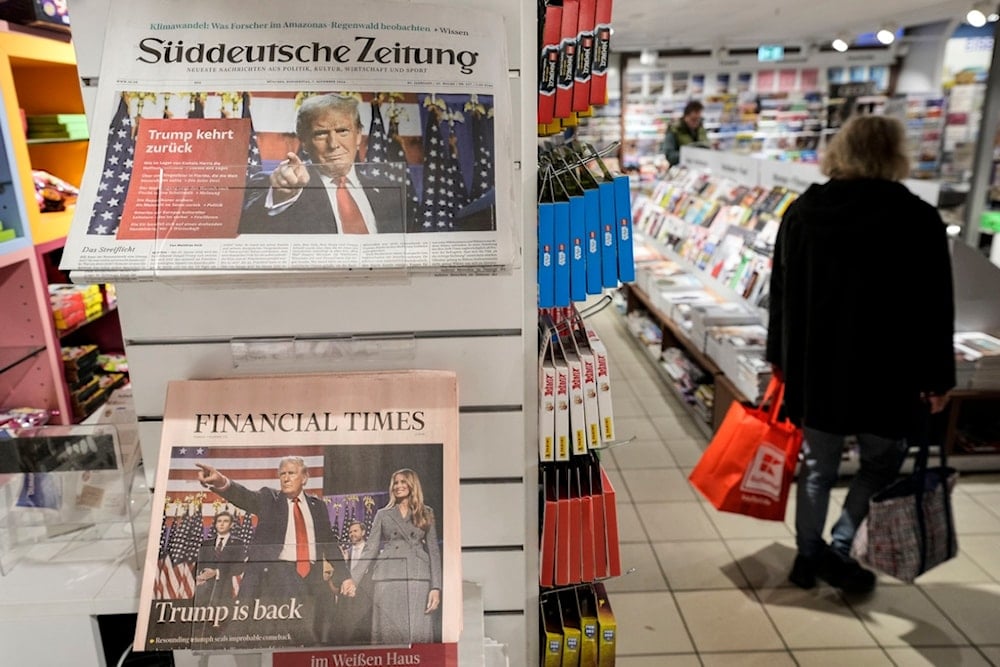Trump's return signals major shake-up in foreign policy: The Guardian
Trump has pledged to target what he terms the "deep state," announcing intentions to fire thousands of federal workers, including many within the State Department.
-

Newspapers front-pages with President-elect Donald Trump are seen at a station kiosk in Cologne, Germany, Thursday, November 7, 2024. (AP)
The Guardian on Thursday reported that the United States is bracing for what could be one of the most substantial transformations in its foreign policy in years.
With Donald Trump set to assume office in January, his administration has promised sweeping changes to America's diplomatic stance, vowing to dismantle established policies and drastically reshape how the US engages abroad.
Trump has pledged to target what he terms the "deep state," announcing intentions to fire thousands of federal workers, including many within the State Department, whom he views as obstacles to his vision for a streamlined, America-first government.
Key departments and programs that emphasize international cooperation, refugee resettlement, and human rights protections could be restructured or altogether disbanded, according to sources close to his transition team.
Pivot on Ukraine
His focus, however, is not limited to domestic bureaucracy. Internationally, Trump has signaled a decisive pivot on Ukraine, planning to significantly reduce military aid to Kiev.
This has spurred the current Biden administration to accelerate efforts to solidify support for Ukraine before Trump could impose his new approach.
Biden officials are reportedly working to approve billions in funding, in part to reassure European allies who have become increasingly anxious over potential US withdrawal from Ukraine's defense efforts.
Read more: Kremlin downplays Trump win's impact on US-Russia relations
In addition, Trump's stance could influence US-"Israel" relations, where he has hinted at loosening restraints on Israeli Prime Minister Benjamin Netanyahu's operations in Gaza and potentially Lebanon.
Analysts suggest that under Trump, the US would likely adopt a more hands-off approach, reshaping America's role in the Middle East amid heightened regional tensions.
Hawkish come-back
Preparing for a second Trump term, sources have noted that Trump's campaign team has already selected Brian Hook—a key figure in his previous administration known for a hawkish foreign policy perspective—to lead the transition for the State Department.
As part of this overhaul, Trump is expected to reintroduce "Schedule F," a designation that would strip civil service protections from federal employees, making it easier to dismiss those considered "rogue bureaucrats."
Foreign policy experts and some current diplomats have expressed concern over the uncertainty of Trump's plans. While some view his bold agenda as mere bluster, others are bracing for a radical shift.
"The instinct will be to toss all of Biden's foreign policy in the dumpster," said a former senior diplomat. This sentiment reflects the unpredictability Trump brings to his role, particularly regarding established diplomatic norms.
Project 2025
At home, the conservative Heritage Foundation's "Project 2025" report offers a potential blueprint for Trump's policy approach, calling for a reassessment of refugee admissions and a reorganization of State Department resources to address domestic challenges.
The memo, co-authored by former Trump official Kiron Skinner, proposes that Trump's team reexamine all treaties, international agreements, and diplomatic commitments, pausing their implementation until a full review could be conducted.
As the Biden administration enters its final months, it is reportedly prioritizing its last opportunities to stabilize international relations, with Biden expected to push a pro-Ukraine agenda at the upcoming G20 summit in Rio de Janeiro, Brazil.
Whether these efforts will hold under a new administration remains unclear, leaving US allies and partners worldwide anxiously awaiting confirmation of Trump's agenda as he prepares to take office.
Read more: Why US foreign policy is under fire from populist Right: FPIF

 4 Min Read
4 Min Read








